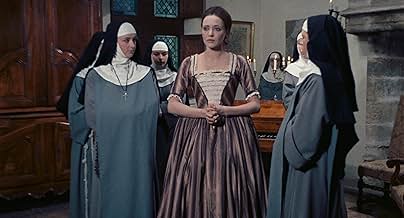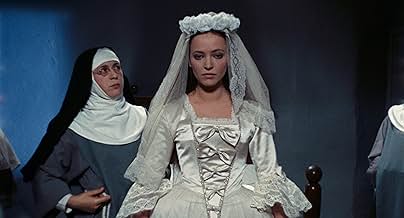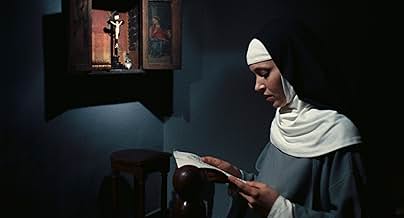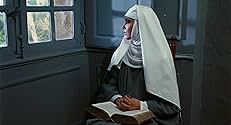CALIFICACIÓN DE IMDb
7.5/10
3.4 k
TU CALIFICACIÓN
Suzanne se ve obligada contra su voluntad a convertise en monja.Suzanne se ve obligada contra su voluntad a convertise en monja.Suzanne se ve obligada contra su voluntad a convertise en monja.
- Dirección
- Guionistas
- Elenco
- Premios
- 2 nominaciones en total
- Dirección
- Guionistas
- Todo el elenco y el equipo
- Producción, taquilla y más en IMDbPro
Opiniones destacadas
As the ruthless Diana Monti in Georges Franju's 'Judex' (1963), Francine Berge (soon to be seen in Philippe Garrel's forthcoming 'La Lune Cravee') had attempted to abduct virginal young heroine Jacqueline Favreaux (played by Edith Scob) while disguised as a nun. Three years later it's now Anna Karina she has in her clutches as the cruel Sister Sainte-Christine.
As it reels from one abuse scandal to the next the last thing the Catholic Church needs right now is the timely revival of this harrowing reminder of the sheer relentless boredom and awfulness of convent life over two centuries earlier into which young women were often cast for financial rather than spiritual reasons. Especially as we now know the church was still pursuing it's abuse of the vulnerable even as it waged a furious campaign to suppress this film on it's initial appearance back in the sixties.
An incongruously sumptuous-looking production in widescreen & colour from one of the most austere directors of the Nouvelle Vague, the film is of course vastly enhanced by the melancholy beauty of Anna Karina in the title role and by the ever delightful Lilo Pulver as the sapphist Mother Superior of a rollicking and worldly convent that closely resembles Castle Anthrax in 'Monty Python and the Holy Grail'.
As it reels from one abuse scandal to the next the last thing the Catholic Church needs right now is the timely revival of this harrowing reminder of the sheer relentless boredom and awfulness of convent life over two centuries earlier into which young women were often cast for financial rather than spiritual reasons. Especially as we now know the church was still pursuing it's abuse of the vulnerable even as it waged a furious campaign to suppress this film on it's initial appearance back in the sixties.
An incongruously sumptuous-looking production in widescreen & colour from one of the most austere directors of the Nouvelle Vague, the film is of course vastly enhanced by the melancholy beauty of Anna Karina in the title role and by the ever delightful Lilo Pulver as the sapphist Mother Superior of a rollicking and worldly convent that closely resembles Castle Anthrax in 'Monty Python and the Holy Grail'.
Although Jacques Rivette was labeled "new wave","la religieuse" is actually an austere work,a bit academic,very close to the pre-new wave generation,very close to Jean Delannoy.By far ,one of the two most palatable works by highbrow Rivette (the other one being the umpteenth version of Joan of Arc,thanks to Sandrine Bonnaire's portrayal).Needless to say ,all other Rivette works are "intellectual" works ,reserved for the happy(?) few ,and they will make yawn your head off.
"La religieuse" caused a big scandal when it was released in the mid-sixties.The Church insisted on calling the movie "Suzanne Simonin ,la religieuse de Diderot".
Released with a PG 18, the movie seems harmless today:yes there's a lesbian nun ,but the crowds have seen worse since.It's a jansenist work,with a very slow pace,faithful to Diderot's novel-which anyway depicted an improbable situation:they did not lock the girls in nunneries anymore ,it was a thing of the past in the XVIII th century-,except for the ending ,but Rivette's one makes sense all in all.
The cinematography is beautiful and anti-nouvelle vague,the actresses convincing:Micheline Presles,a saint of a nun,Anna Karina, her cruel mother's unfortunate victim,and Liselotte Pulver,a bon vivant character who's got a crush on Suzanne .
"La religieuse" caused a big scandal when it was released in the mid-sixties.The Church insisted on calling the movie "Suzanne Simonin ,la religieuse de Diderot".
Released with a PG 18, the movie seems harmless today:yes there's a lesbian nun ,but the crowds have seen worse since.It's a jansenist work,with a very slow pace,faithful to Diderot's novel-which anyway depicted an improbable situation:they did not lock the girls in nunneries anymore ,it was a thing of the past in the XVIII th century-,except for the ending ,but Rivette's one makes sense all in all.
The cinematography is beautiful and anti-nouvelle vague,the actresses convincing:Micheline Presles,a saint of a nun,Anna Karina, her cruel mother's unfortunate victim,and Liselotte Pulver,a bon vivant character who's got a crush on Suzanne .
During the 17th and 18th centuries it appears to have been quite common in Catholic countries for young women to be forced to enter convents against their will; this is, for example, the fate of one character in Manzoni's "The Betrothed", written in 1827 but set around 200 years earlier. "La Religieuse" by Denis Diderot is another work of literature which deals with the same problem. The main reason for this phenomenon was economic; although many convents required a "dowry" from prospective entrants, this was generally less than the amount of the dowry needed to attract a suitable husband, and once the girl had taken her vows the family no longer had any responsibility for her upkeep. In the case of Diderot's heroine Suzanne Simonin, however, there is another problem. She is the offspring of an extra-marital affair and her mother's husband is not her biological father. Suzanne's mother, therefore, resolves to shut her daughter up in a convent, partly because she believes that this will prevent her husband from discovering the truth, partly because the presence of the girl in the family home is a constant reminder of her adulterous affair, about which she now has a guilty conscience.
The film follows the unhappy Suzanne's life as a nun. It falls into three sections, corresponding to the three Mothers Superior under whom she serves. The first, Madame de Moni, is a kindly woman who knows that Suzanne has only entered into the religious life with great reluctance and does her best to make the girl's life bearable. When de Moni dies, however, the new Mother Superior, the fanatical and puritanical Sister Sainte-Christine takes a dislike to Suzanne, whom she sees as rebellious, treating her harshly, whipping her, putting her on a diet of bread and water, and forbidding the other nuns to have anything to do with her. (Sainte-Christine is also referred to by her family name, Madame de Tourmont, a name probably chosen because of its similarity to "tourment", French for "torment").
With the assistance of a sympathetic lawyer, Suzanne asks to be released from her vows, on the grounds that she was forced to become a nun against her will. This application is unsuccessful, but at least she is transferred to another convent. Sainte-Christine is reprimanded by the Bishop for her treatment of Suzanne, but is not otherwise punished. This change in Suzanne's fortunes, however, is not necessarily for the better. Whereas Sainte-Christine's regime was characterised by an excess of religious zeal, life in the new convent is marked by an almost total lack of it. The nuns pay only the bare minimum of attention to their religious observances, spending most of their time in gossiping, eating and drinking and frivolous entertainments. Suzanne is befriended by the Mother Superior Madame de Chelles, who despite her elevated rank is a gay (in the original sense), light-hearted young woman, not much older than Suzanne herself. What the naive Suzanne fails to realise is that her new friend is also gay in the modern sense of the word and is offering her rather more than platonic friendship.
There are some excellent performances, from Anna Karina as the naïve but spirited Suzanne, Liselotte Pulver as the hypocritical de Chelles, Francine Bergé as Sainte-Christine and Francisco Rabal as Dom Morel, a priest who offers to help Suzanne but might also have self-serving motives. For a French movie this one is surprisingly international- Karina was Danish, Pulver Swiss and Rabal Spanish. Another important role is played by the German Wolfgang Reichmann.
When this film was made in 1966 it was promptly banned by the French authorities. It might have been the swinging sixties in the Anglo-Saxon world, but De Gaulle's France was a surprisingly conservative place. The authorities objected to what they saw as a disrespectful attitude to the Catholic Church, even though the action takes place 200 years in the past and the events depicted are fictitious ones. The film, however, is not particularly erotic; in Diderot's novel Suzanne and de Chelles actually end up in bed together- the younger girl is too innocent to realise what is happening to her- but this scene is omitted from the film.
The decision to omit this scene was, I think, the correct one, as "La Religieuse" was not made as a soft-porn fantasy but as a serious examination of three different types of religious hypocrisy, that of de Chelles, that of Suzanne's parents and that of Sainte-Christine, whose treatment of Suzanne owes more to an innate sadism than it does to genuine religious fervour. The serious nature of the film is emphasised by the austere look which director Jacques Rivette brings to it. Most of the action takes place in enclosed rooms, giving it a claustrophobic feel, and the predominant colour is the grey of the convent walls and of the nuns' habits. The moral climate in France gradually became more liberal, the ban was soon lifted and today "La Religieuse" can be seen as a major work of the French cinema. 8/10
The film follows the unhappy Suzanne's life as a nun. It falls into three sections, corresponding to the three Mothers Superior under whom she serves. The first, Madame de Moni, is a kindly woman who knows that Suzanne has only entered into the religious life with great reluctance and does her best to make the girl's life bearable. When de Moni dies, however, the new Mother Superior, the fanatical and puritanical Sister Sainte-Christine takes a dislike to Suzanne, whom she sees as rebellious, treating her harshly, whipping her, putting her on a diet of bread and water, and forbidding the other nuns to have anything to do with her. (Sainte-Christine is also referred to by her family name, Madame de Tourmont, a name probably chosen because of its similarity to "tourment", French for "torment").
With the assistance of a sympathetic lawyer, Suzanne asks to be released from her vows, on the grounds that she was forced to become a nun against her will. This application is unsuccessful, but at least she is transferred to another convent. Sainte-Christine is reprimanded by the Bishop for her treatment of Suzanne, but is not otherwise punished. This change in Suzanne's fortunes, however, is not necessarily for the better. Whereas Sainte-Christine's regime was characterised by an excess of religious zeal, life in the new convent is marked by an almost total lack of it. The nuns pay only the bare minimum of attention to their religious observances, spending most of their time in gossiping, eating and drinking and frivolous entertainments. Suzanne is befriended by the Mother Superior Madame de Chelles, who despite her elevated rank is a gay (in the original sense), light-hearted young woman, not much older than Suzanne herself. What the naive Suzanne fails to realise is that her new friend is also gay in the modern sense of the word and is offering her rather more than platonic friendship.
There are some excellent performances, from Anna Karina as the naïve but spirited Suzanne, Liselotte Pulver as the hypocritical de Chelles, Francine Bergé as Sainte-Christine and Francisco Rabal as Dom Morel, a priest who offers to help Suzanne but might also have self-serving motives. For a French movie this one is surprisingly international- Karina was Danish, Pulver Swiss and Rabal Spanish. Another important role is played by the German Wolfgang Reichmann.
When this film was made in 1966 it was promptly banned by the French authorities. It might have been the swinging sixties in the Anglo-Saxon world, but De Gaulle's France was a surprisingly conservative place. The authorities objected to what they saw as a disrespectful attitude to the Catholic Church, even though the action takes place 200 years in the past and the events depicted are fictitious ones. The film, however, is not particularly erotic; in Diderot's novel Suzanne and de Chelles actually end up in bed together- the younger girl is too innocent to realise what is happening to her- but this scene is omitted from the film.
The decision to omit this scene was, I think, the correct one, as "La Religieuse" was not made as a soft-porn fantasy but as a serious examination of three different types of religious hypocrisy, that of de Chelles, that of Suzanne's parents and that of Sainte-Christine, whose treatment of Suzanne owes more to an innate sadism than it does to genuine religious fervour. The serious nature of the film is emphasised by the austere look which director Jacques Rivette brings to it. Most of the action takes place in enclosed rooms, giving it a claustrophobic feel, and the predominant colour is the grey of the convent walls and of the nuns' habits. The moral climate in France gradually became more liberal, the ban was soon lifted and today "La Religieuse" can be seen as a major work of the French cinema. 8/10
"The crux is, for Susanne, devout as she is, she feels that she has never received the calling from God. Her eventual vow-taking ceremony is conspicuously omitted on the screen, and reckoning by the reactions of her mother (Lénier) and Mother Superior Mme de Moni (Presle, ever so graceful and compassionate), something is certainly amiss there. Later Susanne claims that she has no recollection of the ceremony, perhaps she was in a fugue, witnessed by many, that fact could have been graciously taken as a testimony of revoking her vows had the church assumed a more liberal attitude towards its devotees. So one can see that it is religious orthodoxy, not Catholic church itself is the fair game here."
read my full review on my blog: cinema omnivore, thanks
read my full review on my blog: cinema omnivore, thanks
This is exactly the kind of thing I would watch on Encore movie channel as a 13 year old in the 90s and think because it was a highly specific film hidden in the dark hour of 2 AM that it must be underground or convey secret things about life.
And I guess it does if these are secret, irrelevant, forgotten things, like the dream of a previous era that one can never know to be true or false.
But for sure, the films I saw like this I won't forget. They are like whole history lessons delivered in double--the time period of the story, and the culture period of the production.
The acting, and the beautiful set pieces and locations, and the nonmusical, drony bell music add to this impression of jarringly subtle value, meanwhile the story has that quality of classic French novels which I can somehow feel emanating from old Penguin paperbacks... the height of drama in an atmosphere of emptiness, the pathetic outnumbered by the purely unsympathetic, scene after scene; and all of it mired in seriousness and God.
Drink a few beers and go for it!
And I guess it does if these are secret, irrelevant, forgotten things, like the dream of a previous era that one can never know to be true or false.
But for sure, the films I saw like this I won't forget. They are like whole history lessons delivered in double--the time period of the story, and the culture period of the production.
The acting, and the beautiful set pieces and locations, and the nonmusical, drony bell music add to this impression of jarringly subtle value, meanwhile the story has that quality of classic French novels which I can somehow feel emanating from old Penguin paperbacks... the height of drama in an atmosphere of emptiness, the pathetic outnumbered by the purely unsympathetic, scene after scene; and all of it mired in seriousness and God.
Drink a few beers and go for it!
¿Sabías que…?
- TriviaDespite being approved by the Censorship Board the film's theatrical release was initial blocked by the Minister of Information.
- ErroresSuzanne plays and sings the song "Plaisir D'Amour". The final title card identifies the time and place as 'Paris, 1760', but the song was not composed until 1785.
- Citas
Monsieur Hébert: Your superior will shortly be told in the name of Sister Marie-Suzanne Simonin of a protest against her vows with a request to leave religious life and leave the cloister to live her life as she sees fit.
- ConexionesFeatured in Deux de la Vague (2010)
Selecciones populares
Inicia sesión para calificar y agrega a la lista de videos para obtener recomendaciones personalizadas
- How long is The Nun?Con tecnología de Alexa
Detalles
Taquilla
- Total en EE. UU. y Canadá
- USD 30,245
- Fin de semana de estreno en EE. UU. y Canadá
- USD 6,273
- 6 ene 2019
- Total a nivel mundial
- USD 32,659
- Tiempo de ejecución2 horas 14 minutos
- Mezcla de sonido
- Relación de aspecto
- 1.85 : 1
Contribuir a esta página
Sugiere una edición o agrega el contenido que falta

Principales brechas de datos
By what name was La religieuse (1966) officially released in India in English?
Responda
![Ver Bande-annonce [OV]](https://m.media-amazon.com/images/M/MV5BZjIxOTRkY2ItNjJkOS00ZWMwLWFkM2UtY2FmYzU4NTIyNWQ2XkEyXkFqcGdeQXRodW1ibmFpbC1pbml0aWFsaXplcg@@._V1_QL75_UX500_CR0)





























